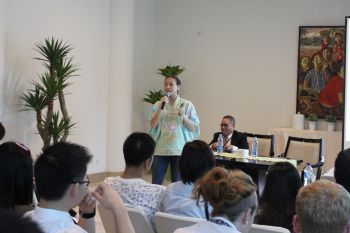
|
||
| “We cannot just be silent seeing the fact of human trafficking and slavery that’s happening right now, there is something that must be done to help them,” that was the words repeated over and over by Rahayu Saraswati D. Djojohadikusumo, well known as Sara, in the panel discussion “Human Trafficking and Modern Day Slavery”. Sara is the founder of Parinama Astha Foundation and Indonesia for Freedom Movement, which is active in eradicating the human trafficking and slavery in Indonesia. Parinama Astha itself means ‘to transform into hope’. | ||
|
||
| Even though the trafficking condition has worsening, it does not mean there is not any solution. “There are many researches and efforts to fight human trafficking, but there is no network to connect that information,” explained Sara. Sara hoped that students of UPH Faculty of Law could act to fight the trafficking whether it is small or large. “With researches or even by only spreading these facts, we could develop the awareness of human trafficking,” she added.
The discussion continued with the speaker Edwin Rekosh, a lecturer in Columbia Law School and Executive Director of PILnet: The Global Network of Public Interest Law. In his session, Edwin explained how the law could be used as a solution for the problems in society. The audiences then raised some of the social problems that are happening nowadays such as drugs and poverty. Edwin described how those problems could be solved with law. For example, for drugs problem, one of the solution is to legalize the usage of methadone. Methadone could be used as an anti-addictive for the drugs user, however, because methadone is still classified as drugs, the legal usage of this substance is still prohibited. The two-hour seminar that was held on Wednesday, April 17, 2013 ended with giving the souvenirs to both of the speakers. Approximately 80 participants, consisted of UPH Faculty of Law students and lecturers as well as other universities’ Faculty of Law students, attended this seminar. (lau)
|
||
|
||
| UPH Media Relations |

 Edwin Rekosh explained the social problems solution through law.
Edwin Rekosh explained the social problems solution through law.






